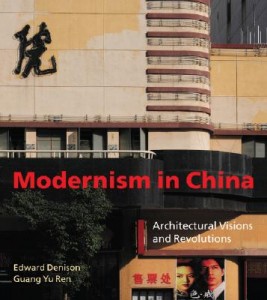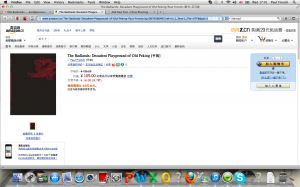Posted: March 29th, 2013 | No Comments »
An interesting event if you happen to be Chengdu way…
Architecture and the Landscape of Modernity in China before 1949
Edward Denison and Guang Yu Ren
Sunday, March 31st, 5:30pm
Chengdu Bookworm
FREE

With building traditions spanning nearly five millennia, China boasts the longest continuous architectural lineage in history. Today, the country’s architectural aspirations are equally unprecedented, forming an omnipresent backdrop to the country’s glass-clad high-rises. However, linking past and present was a period of modernisation that revolutionised China’s architectural landscape and has been largely overlooked.
The history of China’s architectural encounter with modernity offers twenty-first century observers a unique insight into one of the most unprecedented and important manifestations of modernism outside the West – where the formation of an architectural modernism in China derived not only from the West, but also from the East.
Edward Denison is an independent consultant specialising in architectural and urban history.
Guang Yu Ren is a researcher and consultant specialising in architecture and the built environment. Guangyu is now based in London where she works as an advisor to firms working in China and co-authors books on architecture and design with Edward Denison.
Posted: March 29th, 2013 | No Comments »
A Shanghai RAS event of possible interest…
Hidden Treasures: An Exploration of Antique Maps of China and Asia, 16-18th Century
Vince Ungvary
Saturday 30th March, Registration 3:30 PMÂ – starts at 4:00 PM
The Tavern, Radisson Blu Plaza Xingguo Hotel 78 XingGuo Road, Shanghai

The history of Europe’s interactions with Asia is no better documented than through the maps that were produced by Europeans over a long period of time. From the time of Ptolemy in 150AD, maps of Asia had showed parts of the continent based on the scant information at the time provided by explorers and traders. For the next 1500 years, maps of Asia hardly changed from the Ptolemaic tradition. Even Marco Polo’s famous travels to China in the 13th century didn’t substantially alter the European conception of Asia’s geography although it did provide the impetus for the Age of Exploration by the Portuguese and the Spaniards in the 16th century to the Asian region. The search for trade opportunities, particularly of gold, silver and spices as well as silk and porcelain led to other nations joining the fray including England and Holland in the early to late 17th century. The Age of Exploration eventually led to European imperialism in Asia as Europe flexed its economic, political and technological muscle across the region.
Vince Ungvary is a graduate of Asian studies from Murdoch University, Perth, Western Australia where he majored in Modern Chinese History and Indonesian. Subsequent to his degree, Vince completed a post graduate degree of Marketing at Edith Cowan University, Perth. Vince has worked in the Asian region since 1991, first in Jakarta, Indonesia and then for the last 10 years in Shanghai.
Vince took up his passion of map collecting 15 years ago when he visited a house on the outskirts of New Delhi, only to find it was actually an antique bookstore and full of antique maps of Asia. Vince has since built his map collection which focuses mainly on Antique maps of Asia and China from the 16th century to the 19th century (and a few rare ones of pre-1949 Shanghai) to a collection of around 800 maps.
We will follow this course of history by seeing the changes in European conception and knowledge of Asia and China through the eyes of the map makers of those times. Actual examples of antique maps of Asia and China from the 1500’s, 1600’s and 1700’s will be displayed from Vince’s collection.
Next The Exhibition:
Walk along to
HONG MERCHANT GALLERY
N° 3 Lane 372 Xing Guo Road
(by Huaihai Road), Shanghai
To view Exhibition
Exhibition time: 5.45pm
Talk Cost: RMB 80.00 (RAS members) and RMB 130.00 (non-members). Includes one drink of 150 ml. glass of red or white wine/draft beer/soft drink/ tea or coffee. Those unable to make the donation but wishing to attend may contact us for exemption.
Exhibition Cost: Free
Membership applications and membership renewals will be available at this event.
RAS Monographs: Series 1 & 2 will be available for sale at this event. RMB 100 each (cash sale only).
To RSVP:Â Please “Reply” to this email or write to
RAS Bookings at: bookings@royalasiaticsociety.org.cn
Posted: March 28th, 2013 | No Comments »
An interesting post on Shanghaiist about the St Nicholas Russian Orthodox Church on Gaolan Road (formerly Rue Corneille in the old French Concession). Shanghailander Russians, it seems, got in there to have a service. The place has been through many incarnations – I remember the old Ashanti Dome restaurant well which was quite lovely (I don’t recall if the food was any good though). I posted back in 2009 about the “refurbishment” of the Church, built in 1934 – even in the Ashanti Dome days the nipples of the females painted in the frescoes on the ceilings had been covered by some purist Communist!! I thought it had been turned into a coffee shop for retired Communist Party cadres, but haven’t wandered down that streets for ages. The addition of a disco ball is rather disconcerting whether you consider the building a Commie retirees cafe or a Russian Orthodox Church really!! Anyway pics on Shanghaiist.
Posted: March 27th, 2013 | No Comments »
For anyone in China – just to let you know the limited edition (only available in Hong Kong, China and Australia) of my forthcoming e-book (everyone in the next couple of months) The Badlands: Decadent Playground of Old Peking, which is some back stories from the characters of the Peking Badlands in Midnight in Peking (now by the way just UK4.99 on Amazon.co.uk), is available on Amazon China here.

Posted: March 27th, 2013 | No Comments »
This building, on the junction of Taiyuan Road and Zhaojiabang Road (formerly Route Delastre and Rue de Zikawei), may not look very glamorous or particularly architecturally interesting but it is of importance for a couple of reasons. Firstly, it is in the former French Concession and does provide part of the architectural landscape, such as is left, of the area. A motley crew of real estate agents, various misguided foreigners without eyes and officials try to constantly tell me that there will be no more destruction in the French Concession but this is clearly not true as buildings keep getting pecked away at and disappearing.
Secondly, this building was formerly on the less glamorous side of the Concession which was partly residential but partly light industrial. Indeed this building is actually an industrial property (as you can see from the pictures of the interior below). I’ve argued before that preservation can’t be just about big houses or important buildings but must also be aware of the need to preserve more ordinary housing and industrial architecture (the losses of industrial architecture are heaviest in Yangpu and Hongkou but there are bits and pieces elsewhere too. Anyway, this one is marked to go and one has to wonder about the fate of the slightly nicer and more architecturally interesting residential properties adjacent (as also shown below).
 The condemned corner block…
The condemned corner block…
 And a little closer….
And a little closer….

The light industrial unit it houses… 
The quite nice residential block immediately adjacent to the west that must now also be threatened
Posted: March 26th, 2013 | No Comments »
This book by Liam D’Arcy-Brown, Chusan, appeared last year but it’s taken me a while to get hold of a copy (no Kindle version annoyingly)….a little niche in the greater Opium Wars story filled….

“We must religiously observe our engagements with China, but I fear that Hong Kong is a sorry possession and Chusan is a magnificent island admirably placed for our purposes.” So wrote the home secretary Sir James Graham to the prime minister Sir Robert Peel, as British diplomats prepared to return the island of Chusan to Chinese rule during the winter of 1845. For years, this now little-known island off the coast of Zhejiang province had been home to thousands of men, women and children of all classes and backgrounds, of all races and religions, from across the British Empire and beyond. Before the Union Jack ever flew over Hong Kong, it had been raised on Chusan. From a wealth of primary archives, Liam D’Arcy-Brown pieces together the forgotten story of how the British wrested Chusan from the Qing dynasty, only to hand it back for the sake of Queen Victoria’s honour and Britain’s national prestige. At a time when the Chinese Communist Party is inspiring a new brand of patriotism by revisiting the shame inflicted during the Opium Wars, here is a book that puts Britain’s incursions into nineteenth-century China in a fascinating and revealing new light.
Posted: March 25th, 2013 | No Comments »
I ran an ad for Bianchi’s pastries a couple of years back but more recently found this one for their ice creams and sodas and thought, as Bianchi’s looks like such a great place (and they do wedding cakes!) and was massively popular with Shanghailanders in the 1930s I’d run this one too…

Posted: March 24th, 2013 | No Comments »
We’ve not been overly blessed by good memoirs on North Korea – largely because so few people visit, let alone get to be stationed there for any significant length of time. John Everard is a different case – he was British Ambassador to Pyongyang from 2006-2008. Only Beautiful Please is his memoir of that time. As usual I won’t review here as I get asked to review elsewhere but details below…there’s also a longer review by Kerry Brown on the Asian Review of Books sites here.

Coverage of the Democratic People’s Republic of Korea (DPRK) all too often focuses solely on nuclear proliferation, military parades, and the personality cult of its leaders. As the British ambassador to North Korea, John Everard had the rare experience of living there from 2006, when the DPRK conducted its first nuclear test, to 2008. While stationed in Pyongyang, Everard’s travels around the nation provided him with numerous opportunities to meet and converse with North Koreans.
Only Beautiful, Please goes beyond official North Korea to unveil the human dimension of life in that hermetic nation. Everard recounts his impressions of the country and its people, his interactions with them, and his observations on their way of life. He also provides a picture of the life of foreigners in this closed society, considers how the DPRK evolved to its current state, and offers thoughts on how to tackle the challenges that it throws up, in light of the failure of current approaches. The book is illustrated with often striking photographs taken by Everard during his stay in North Korea.









